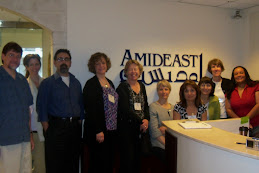Dear Readers:
I mentioned in an earlier blog that I could not find much Gulf literature to speak of. Let me clarify that I have not been able to find Gulf literature translated in English. I confess, dear readers, that I do not speak Arabic, although I’m getting a hankering to learn it.
It’s not hard to find books printed in English here, but almost all of them are American (and European to a lesser extent). There are Anglo-American classics and there are plenty of best-seller type books. The Twilight series is selling very well here, as is the business self-help book Who Moved My Cheese? There just isn’t any literature written in this part of the world (that’s been translated in English.)
One theory is that there are plenty of Kuwaiti writers; they just haven’t been translated and published because of anti-Arab bias by the Western publishing houses. This was an explanation I received last night at a Kuwaiti gathering. That may be true, but this explanation doesn’t explain why there seems to be plenty of translated Arabic literature coming out of places like Egypt, Syria, and Lebanon. It also doesn’t explain where there is a distressing (to me) lack of bookstores or literary culture that I can discern. There is ONE bookstore in all of Kuwait (population about 3 million people) and it is pretty paltry in comparison to your average Borders or Barnes and Nobles. (For the record, Dubai has some very good bookstores and one fantastic Japanese owned bookstore with a great selection of Middle Eastern history and literature in English. But even in that fantastic bookstore, there was very little from the Gulf region, but a lot from Egypt and other parts of the Middle East.)
The people in charge of our Fulbright Tour also couldn’t seem to find any local academics who were able to speak about local literature. I’m not sure if it is because they didn’t try very hard or because literature people are rare species. It’s not that people in this region are poorly educated. They are not. But it seems that the education focuses on practical professional skills as opposed to the liberal arts.
It seems that the most logical conclusion is that reading and writing simply isn’t a big part of the culture in this part of the world. (I say this despite the fact that whenever we ask a local person about writing, they say things like “Oh, there are lots of writers. My wife’s second cousin’s neighbor is a very well known writer.” But if asked to name names of authors or books, nobody can quite think of any.) I could be wrong and would be happy to be enlightened. I also suspect that the situation will change given the huge growth of women in higher education in this region. I am staying tuned.
Friday, July 2, 2010
Subscribe to:
Post Comments (Atom)

No comments:
Post a Comment